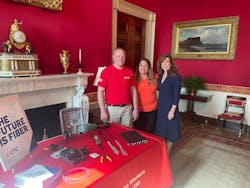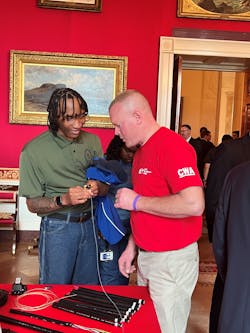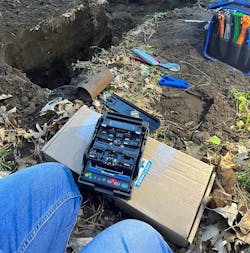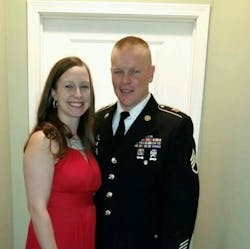Latest from Executive Insights & Interviews
Vet Secrets to Success in Telecom
Q&A with Jeremy Przybilla, Veteran and CTC Member Services Technician
Rural Minnesota may be home to thousands of expansive lakes but it’s also home to one of the most expansive and robust fiber networks in the Midwest. Consolidated Telephone Company (CTC) owns or manages most of that network, continuing to set the standard in telecommunications for much of Minnesota.
As a full-service provider, they currently serve more than 16,000 residential and business members with Internet, phone, TV, and technology services. Within the 1,200 square miles of their service area lies over 4,400 route miles of buried fiber. Additionally, CTC has partnered with electric cooperatives for over 10 years to support their broadband services. For CTC, growing their network—while maintaining the excellent customer service they’re known for—will be the name of the game in 2023.
“Going through Secret Service TSA-style check points with all my tools and seeing their reaction to that stuff going through their scanner, I wish I could’ve recorded that. Their eyes just lit up.”
CTC’s support of the Talent Pipeline Challenge was a no-brainer. Having a stable workforce, while proactively building programs and support for future workforce needs, is a high priority for the expanding cooperative. So, when they were invited to join other telecoms and companies at the Talent Pipeline Challenge Expo a few months ago, they leapt at the chance.
CTC’s CEO/GM, Kristi Westbrock, and Jeremy Przybilla, one of CTC’s member services technicians, flew to Washington, D.C. to join NTCA’s CEO, Shirley Bloomfield, at the White House on November 2, 2022. The objective was to highlight three new partnerships to support the White House’s Talent Pipeline Challenge, designed to promote jobs in infrastructure-related fields. (Source: https://www.ntca.org/ruraliscool/newsroom/press-releases/2022/2/ntca-announces-new-partnerships-provide-apprenticeship)
Upon arriving at the White House, the CTC team set up a table in the Red Room and showed everyone in attendance how to splice fiber. “The whole experience was kind of neat,” Przybilla said. “Going through Secret Service TSA-style check points with all my tools and seeing their reaction to that stuff going through their scanner, I wish I could’ve recorded that. Their eyes just lit up.”
Post-event, ISE wanted to know more about the first person to splice fiber with White House officials. Take a moment to learn about his military experience, his perspective on why he’s successful in the field and what’s next on his list to accomplish in telecom. Then, consider sharing his insights with a veteran you know who should get involved with fiber deployment.
ISE: Why did you join the military? Please share your service branch, date of enlisting, and where you served. Share any medals, awards, or citations you earned.
Przybilla: I joined the military because I wanted more for myself. I wasn't content on where I was in life and needed a change. I joined the Army Reserves in 2004 and proudly wore the uniform until 2017. I was deployed to Iraq, completed many annual training exercises throughout the United States and Central America, and participated in military leadership courses to further my career. In 2015, I was selected as non-commissioned officer (NCO) of the year in my company.
ISE: What was your job assignment? What were the key activities you performed, and in what circumstances/conditions? What people or resources were you responsible for in this role?
Przybilla: My primary military occupational specialty (MOS) was 88M, Motor Transport Operator. My unit mainly transported bulk fuel but would haul anything via 915s (semis). Once I reached the rank of staff sergeant (SSG), I was transferred to another unit where I was a platoon sergeant, overseeing 20-30 soldiers while managing millions of dollars’ worth in equipment and assets needed to complete the mission.
ISE: Why did you choose telecom as a career? How did your service and experience affect your career choice?
Przybilla: In 2002, I went to tech school to be a construction electrician but due to the market it was almost impossible to even get an internship. I started in telecom by working as a contractor for several companies. While contracting for CTC, I applied for and was offered a job, which was great because it was a local company. The demand for the services we install keeps me busy and the ever-changing technology keeps me on my toes.
ISE: Share your role at CTC now, your primary responsibilities, and why you recommend other vets enter the Telecom/ICT industry?
Przybilla: In my current role as a member service technician, I install and troubleshoot phone, Internet, and TV services for residential and business customers in rural Minnesota. The telecom industry is rewarding. Being able to provide services that people want and need is very satisfying.
ISE: Share 1-2 accomplishments at CTC for which you are particularly proud. What is the “secret” to your success?
Przybilla: I take great pride in the service area I cover. My goal is to provide the best service from the beginning—keeping the customers happy and avoiding unnecessary visits.
ISE: What are the translatable skills or character traits you bring to your current role that were formed from your military experience?
Przybilla: The Army Values are Loyalty, Duty, Respect, Selfless Service, Honor, Integrity, and Personal Courage. I live by these every day, even out of the uniform.
ISE: How does your experience in the military aid your ability to work under pressure?
Przybilla: Honestly, pressure in the civilian world doesn't compare to the pressure I experienced in the military. I don't let it bother me though. I can only control so much and as long as one foot moves in front of the other I'm making progress.
ISE: What does the telecom industry need to do to attract more veterans?
Przybilla: In the military, teamwork and camaraderie is critical. If that can somehow be replicated in the telecom industry, it might go a long way to attracting more veterans. We need to be part of the TEAM because as everyone knows, there is no "I" in team!
ISE: What advice would you give to other military veterans as they follow professional aspirations?
Przybilla: Never think you know everything. There is always room for growth or multiple ways to complete the tasks no matter how knowledgeable you are.
ISE: How do you measure success in your career and what’s next on your career roadmap?
Przybilla: Personal satisfaction and customer experience lead to success. If you or your customers are not happy, no one will be successful. My goals are to expand my knowledge in the telecom world. Everyone’s broadband needs are different and changing, just keeping up with today’s technology and being aware of what’s coming around the bend is enough for me.
ISE: How do you keep abreast of the latest technologies in the telecommunications industry?
Przybilla: Constant conversations with co-workers and tech news/blogs are a good way to stay up to date. There is a value to technology, and it’s needed to complete a lot of our day-to-day tasks. This is a fast-paced industry that requires being on top of the latest and greatest.
CONTENT AND PHOTOS
Thank you to Jeremy Przybilla and Anita Hollenhorst, Business Development and Communication Manager, CTC, for the article content and photos. For more information, visit www.goctc.com. Follow them on Twitter and Facebook @ConnectCTC and LinkedIn: https://www.linkedin.com/company/goctc/.

Sharon Vollman | Content Ambassador for ISE EXPO
Sharon Vollman is the Content Ambassador for ISE EXPO. She is passionate about collaborating with thought leaders, SMEs and hard-working doers who design, plan and deploy ultra-reliable broadband networks. Vollman is committed to creating a variety of educational offerings for ISE EXPO attendees that inspire them to connect every U.S. citizen with the broadband networks we all want for our children and grandchildren.
Vollman has created educational partnerships with Broadband Service Providers including AT&T, Verizon, Lumen, Frontier Communications and others. She has covered the telecom industry since 1996.








